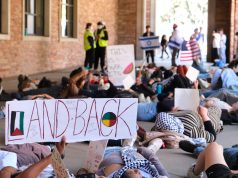But some soldiers saw problems ahead as the nation’s
top military officials on Tuesday called for an end to the “don’t ask,
don’t tell” policy that bans openly gay service members.
Some feared the ban’s end would lead to violence in the ranks. Others predicted a rocky adjustment period to a new policy.
“It’s immaterial to me whether someone is gay if they’re doing their job. I don’t give a damn,” said former Army Sgt.
“But there are people out there who are going to have an issue with this,” said Devine, a paratrooper who served in
In the first congressional hearing on homosexuals in the military in 17 years, Adm.
Mullen’s comments came as the
Defense Secretary
“I think this is a good first step,” said former
35, who was honorably discharged under the “don’t ask, don’t tell”
policy in 2002 when a cadet told her superiors that Hall was having a
relationship with a fellow serviceman. “I think this should have
happened many years ago.
“I liked the military and would go back in,” said
Hall, development director for the Servicemembers Legal Defense
Network, a nonprofit in
“There are those who don’t like women and
African-Americans in the military, but there are policies in place,” he
said. “If that’s your view, keep it to yourself.”
Some area soldiers said they would be concerned for the safety of military personnel who are open about their homosexuality.
“I don’t think (top military officials) are giving this enough thought,” said former Army First Lt.
Caliguire, whose 30-member
“It’s a brotherhood. You’ve got to be one of them,” he said. “You live in very close quarters. There are gay jokes.
“If someone announces he’s gay, there would be
problems. You could have guys get beaten up, and those involved would
get in trouble,” leading to possible discharges.
Like Caliguire,
“Gay soldiers serve as well as anyone else,” said Deguia, 24. “But I personally don’t like them being in a living situation.”
“There’s a camaraderie, and I don’t agree with
having a gay man in that group,” Deguia said. “I would keep the rule we
have. If it ain’t broke, don’t fix it.”
The issue of gays in the military “has been a touchy situation for many years,” said First Sgt.
Vey, who served in
“But as a leader, I don’t want extra aggravation. It’s a distraction,” said Vey, 58, who retired from the
He wonders, he said, whether a repeal of the ban might lead to public displays of affection by same-sex couples.
“If you’re wearing your religion on your sleeve, that would upset people, too,” he said. “If you were (a
Most soldiers “don’t want to know” someone’s sexual orientation, said former
“When you’re serving, you’re there to do a job. You’re worrying about one thing: being a soldier.”
Making gay service personnel declare their sexual
orientation, if that becomes the policy, “is discriminatory,” Hinker
said. “Keep the policy the way it is. I don’t think being openly gay
will work.”
Gay activists disagree and are pushing for quick action to eliminate the ban. Some have criticized President
“How much do we need to study ‘don’t ask, don’t tell?’ ” asked
“This is a watershed moment,” he said. “Of all the
things the president can do to advance the rights of the gay community,
this was the easiest. If he can’t act with more than a speech, then
what the hell will he stand up for?”
—
(c) 2010, The Philadelphia Inquirer.
Visit Philadelphia Online, the Inquirer’s World Wide Web site, at http://www.philly.com/
Distributed by McClatchy-Tribune Information Services.














































